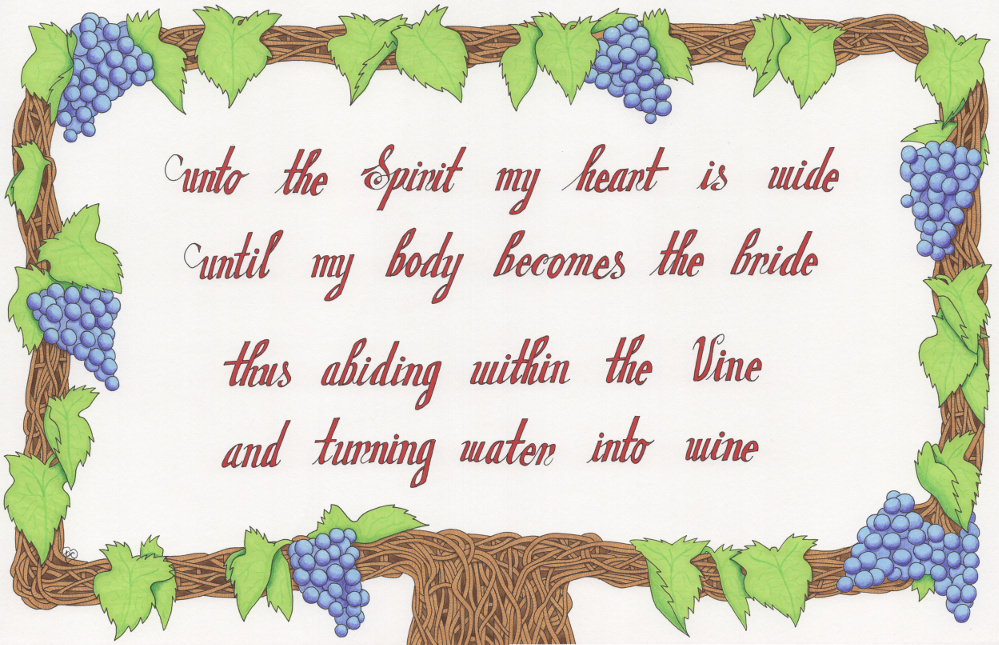Back • Return Home

Click for larger version.
Story / Meaning:
This piece was in an art show put together by my friends for a local "wine-fest". It is based off of a lot of Christian symbolism.
• Line 1: Wine metaphors are prevalent throughout the bible. For example, within three of the synoptic gospels (specifically Mark 2:21–22, Matthew 9:16–17, and Luke 5:36-39), Jesus speaks of "not pouring new wine into old wineskins". A "wineskin" is a type of goat skin pouch used to hold wine. As they get older, they become rigid in their shape. Fresh wine releases gases that can break a wineskin if it is not flexible enough. In other words, this means that we should keep supple within our thinking and feeling in order to be able to embody The Holy Spirit. It is interesting to note that the English word "spirit" represents both an alcoholic beverage and an animating principle. This double-meaning is sometimes used to form puns, like within this line.
To elaborate, "spirit" comes from the Latin "spiritus". This is often used to translate the Greek "pneuma" (where we get the term "pneumatic" or "air-powered" in English). This, in turn, is used to translate the Hebrew "ruach" or "breath". Therefore, the Hebrew term "ruach hakodesh" is translated as "Holy Spirit" within English. These relationships in meaning are not by accident. The Holy Spirit is seen as synonymous with the "breath" of God, and in Genesis 2:7 we read that it is God's "breath" that animates the dust of the Earth to make the first man, Adam. It is this life-giving Holy Spirit that I choose to open my heart to in this line, not the drink. (No judgment upon anyone who drinks alcohol. It just isn't for me.)
• Line 2: "Weddings" are another set of metaphors that are very prevalent throughout the bible. For example, in 2 Corinthians 11:2 Paul states, "I am jealous for you with the jealousy of God himself. I promised you as a pure bride to one husband - Christ." In other words, Paul is encouraging the church in Corinth to be loyal to Christ and what he represents by using the metaphor of a marriage relationship. In case it is not clear, Ephesians 5:21-33 gives a feel for just how seriously they took marriage.
In short, this line is about how the flesh is transformed by remaining faithful to the Spirit described in Line 1.
• Line 3: In John 15:1-8, Jesus describes himself as "The True Vine" in which we should "abide" or patiently wait, and God the Father as "The Vinedresser" or "Gardener" which shapes that vine. To put it another way, God helps us to grow when we sincerely follow what Jesus teaches. Note that grapes grow on a vine, and it is fermented grapes that produce wine. All of these processes take time and care.
This is reiterating the meaning of the previous line. When the flesh is transformed by the Spirit, we become closer to Christ, and by extension, to God.
• Line 4: In John 2:1-11, we read of Jesus's first miracle at a wedding in Cana, turning water into wine.
This connects together the two different symbols of "wine" and "weddings" into a single metaphor, and completes the transformation described by the previous three lines.
Thank you for reading! ♥
